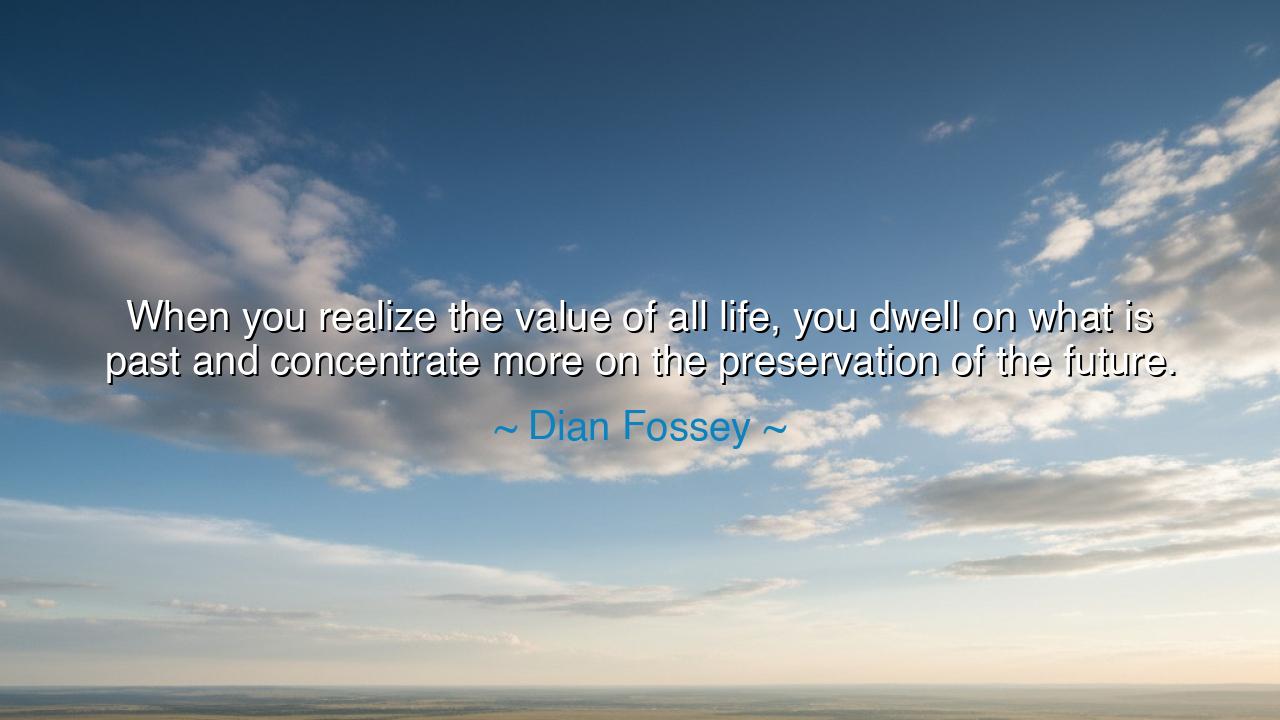
When you realize the value of all life, you dwell on what is past
When you realize the value of all life, you dwell on what is past and concentrate more on the preservation of the future.






"When you realize the value of all life, you dwell on what is past and concentrate more on the preservation of the future." These powerful words, spoken by Dian Fossey, a renowned primatologist and conservationist, carry the weight of a truth that transcends time. Fossey’s life and work, dedicated to the protection of gorillas, embody a deep reverence for life itself, a profound understanding that each living being, no matter how great or small, plays a part in the vast and intricate web of existence. To grasp the value of life, in all its forms, is to see not only the present, but to gaze back into the past and look forward with purpose and resolve into the future.
When one truly understands the value of life, the past becomes a mirror, reflecting the struggles and triumphs of those who have come before us. We dwell not in regret, but in remembrance—remembering the lessons learned from those who lived before us and acknowledging the beauty and fragility of the world they left behind. The past serves as both a guide and a warning. History teaches us of the tragedies we have faced, the injustices we have witnessed, and the victories we have won. Yet, it also calls us to act with greater foresight and wisdom, to avoid repeating the mistakes of old.
Fossey’s work with the mountain gorillas of Rwanda is a testament to this truth. She dedicated much of her life to the study and protection of these magnificent creatures, who faced the threat of extinction due to poaching, habitat loss, and human encroachment. In her relentless pursuit of understanding and preserving these gorillas, Fossey realized that the value of all life—human and non-human alike—was intertwined. She understood that protecting the future of a species requires more than just conservation efforts; it requires a deep respect for the intricate balance of life itself. The protection of one life, in essence, safeguards the future of all life.
Consider the story of Chief Seattle, a leader of the Suquamish and Duwamish tribes, whose words have echoed through generations as a profound reflection on the interconnectedness of all life. He once said, “All things are connected.” His belief that the earth, its creatures, and its people were bound together by sacred ties mirrors Fossey’s own understanding of life’s interconnectedness. Just as Fossey sought to preserve the mountain gorillas, so too did Chief Seattle call for the protection of the land and all its inhabitants. The lesson here is clear: when we understand the value of life, we cannot separate ourselves from the earth or its creatures; we must look to the future with compassion and resolve to ensure the survival of all life forms, human and non-human alike.
The act of preserving the future is not just a noble pursuit; it is a moral imperative. Fossey’s legacy teaches us that when we truly grasp the weight of this truth, we no longer see life as something to be taken for granted. We realize that every action we take has the power to either heal or harm, to either uplift or destroy. The future is shaped by the choices we make in the present. It is not enough to simply acknowledge the value of life; we must protect it, nurture it, and ensure that future generations inherit a world that is rich in diversity and possibility.
This call to action is not limited to those who work directly with endangered species or conservation. It extends to all aspects of our lives. Whether we are protecting the environment, advocating for the rights of marginalized communities, or simply cultivating compassion in our daily interactions, we are all stewards of the future. Fossey’s words compel us to reflect on our role in the world and to dedicate ourselves to actions that will preserve the richness and beauty of life for generations yet unborn.
In the end, the lesson of Fossey’s quote is one of legacy. It asks us to consider not just what we have gained in our lifetimes, but what we will leave behind. As we reflect on the past, let us use that wisdom to shape a future that honors all forms of life, where every being is valued and protected. The preservation of the future requires foresight, commitment, and, above all, a reverence for life in all its diverse forms. Let us act with this understanding, knowing that in the protection of life, we protect the very essence of the world itself.






AAdministratorAdministrator
Welcome, honored guests. Please leave a comment, we will respond soon